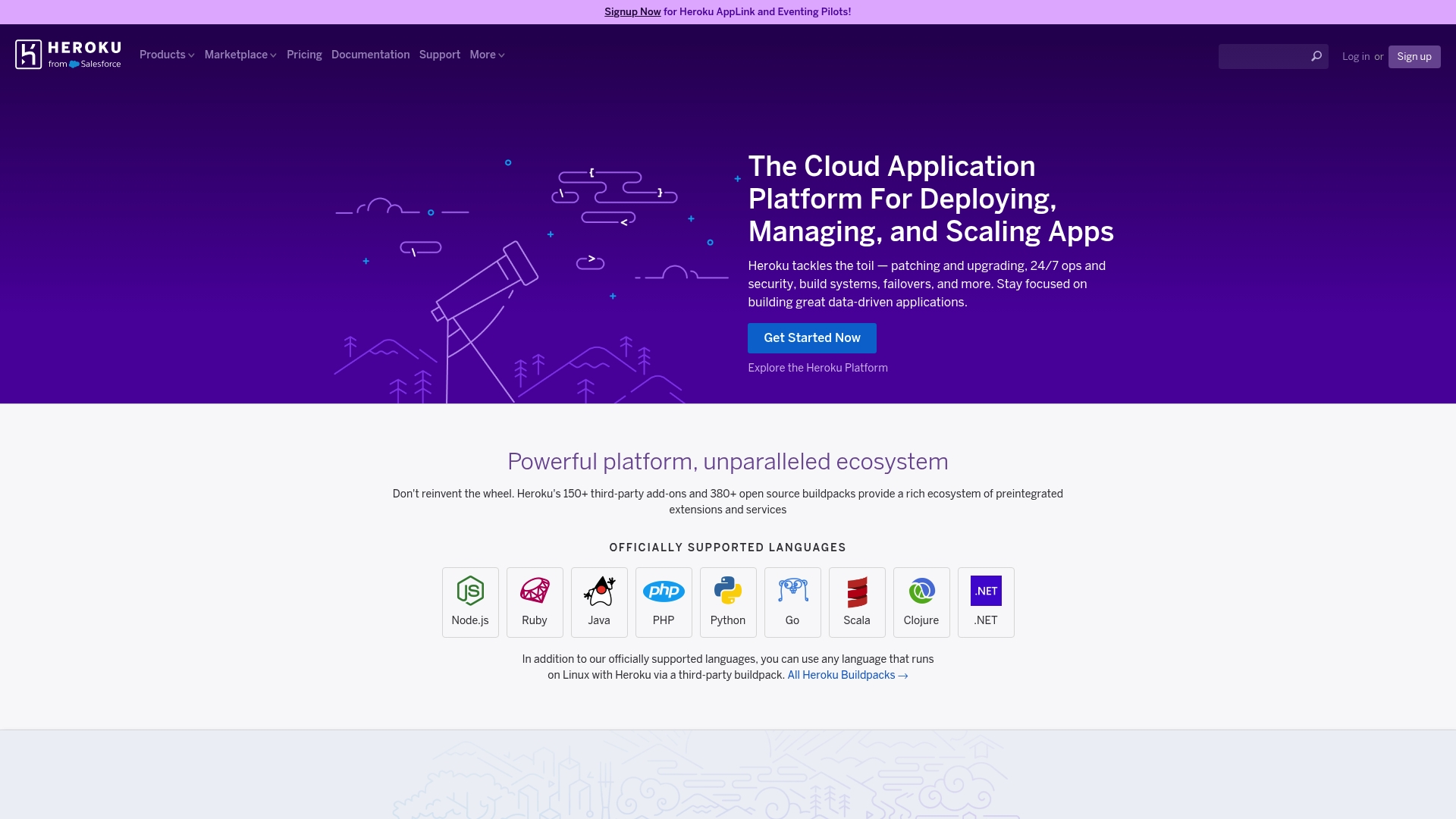

Unclaimed: Are are working at Salesforce Heroku ?
Salesforce Heroku Reviews & Product Details
Salesforce Heroku is a cloud platform as a service (PaaS) that enables developers to build, run, and scale applications in various programming languages and frameworks in the cloud. It simplifies the deployment process, auto-manages the infrastructure, and provides integrated data services, making it easier for developers to focus on writing code without worrying about the underlying hardware or software layers. Heroku supports a wide range of development languages, including Ruby, Java, Node.js, Python, and PHP, offering a highly flexible environment for application development and deployment.
| Company | Salesforce |
|---|---|
| Year founded | 1999 |
| Company size | 10,001+ employees |
| Headquarters | San Francisco, California |
| Social Media |

( 1 )
| Capabilities |
|
|---|---|
| Segment |
|
| Deployment | Cloud / SaaS / Web-Based |
| Training | Documentation |
| Languages | English |


Compare Salesforce Heroku with other popular tools in the same category.

Take a concept live in minutes. Viable for many, many different sizes of project. Ties right into my git workflow with very low hurdles. They provide great docs, and are so widely used that it is easy to find answers to questions through Google.
Their dependence on Amazon brought them down a few times this year.
Not provided
Heroku is a great for having a place to start and trying out new things and ideas that you are looking to being to market. Then, once you know what you're doing, it's an even better for bringing things to market.
As great as Heroku is, there could be more documentation and tutorials on integrating the different programming languages into one
Not provided
Easy implementation and ease of mantainance.
I face a bit of dificullty when my trial application crashed down and to find out the cause it costed me alot.
Simplified development process with a ready-built infrastructure, integrated data services, and a great ecosystem of add-ons and extensions.
Salesforce Heroku provide best interface to transfer data to and from Salesforce to heroku database
Salesforce can provide more details regarding this application to use it easily
It transfer the data from Salesforce to heroku database and also keep it in Salesforce.
Heroku is a PaaS solution for full-stack apps, which means that frontend, backend, and databases may all be deployed on the platform, which most other platforms, such as Netlify and Vercel, do not support. Salesforce Heroku enables us to build bespoke apps with high performance, seamless integration, and low latency. All connectors function via event bus integration, allowing Heroku applications to produce events on our Salesforce platform. Another point in favor of this software is its support team, they always do a good job.
Apps may go to sleep if there is no user engagement for a lengthy period of time, and dealing with Salesforce Heroku has a high learning curve. Experience is required to select which connection to utilize to translate our Salesforce object fields to the table and how to monitor its activity.
Heroku makes it simple for me to swiftly launch my professional full-stack apps by providing readily configurable PaaS solutions, and unlike AWS, I don't have to worry about exorbitant expenses due to complicated design. Through its inbuilt data connections, we can simply combine both internal Salesforce applications and external third-party apps. We can also use Heroku to generate Lightning web components and perform Apex HTTP requests asynchronously.
Salesforce Heroku allows us to install various apps to archive data by a 3rd party archiver and we can process the archived data to be run off-platform in Heroku Postgres then synchronize the stats back to SF. The best part is that the archived data can still be visible on-platform via Salesforce Connect!
The pricing might not be affordable by small company with limited budget as they might not see the benefit from the solution immediately comparing the cost they could reduce from the data storage.
We are able to move SF data off-platform and still keep them calculated and updated in Salesforce nearly real-time.
Very easy to set up and deploy. No need to mess around with configs.
Doesn't have the full offering of standard public clouds, like file storage, auth, etc.
Deploying our webapp.
The best thing about heroku its a easy to use platform for deploying your apps. I have used it a lot for deploying backend of my apps. You also get lots of tutorials related deployment over heroku, then it also beocmes easy.
The only thing I dislike about heroku is adding your payment cards. I tried different cards, cards of my friends as well but none of them worked. I really don't understand what kind of payment card they need.
Heroku is making easy for deploying projects in just a few minutes. You don't need to worry about RAM, Os at all. They just take your code & make it prodution ready in just a few minutes. Although it is paid now but I deployed a lot of my college projects here.
Heroku provides direct optionality to deploy your application with a specific programming language. No config setup or infrastructure maintenance. Good options for limited-scope applications.
Can't deploy massive or large-scale applications as the optionality to config the application is limited. Multiple functionalities like Multi-AZ or load balancer is not there.
For limited-scope products or MVPs where the application is in the ideation phase and doesn't require the DevOps team to monitor it continuously. Applications with small user base can also be catered to.
Heroku is an excellent platform for deploying web applications. It's user-friendly, scalable, and offers a wide range of integrations. With its reliable infrastructure and supportive community, Heroku simplifies the deployment process, allowing developers to focus on building great apps. Highly recommended.
Lacking security controls, especially who can access different addons, and auditing
We are hosting various web apps and apis as well as databases




